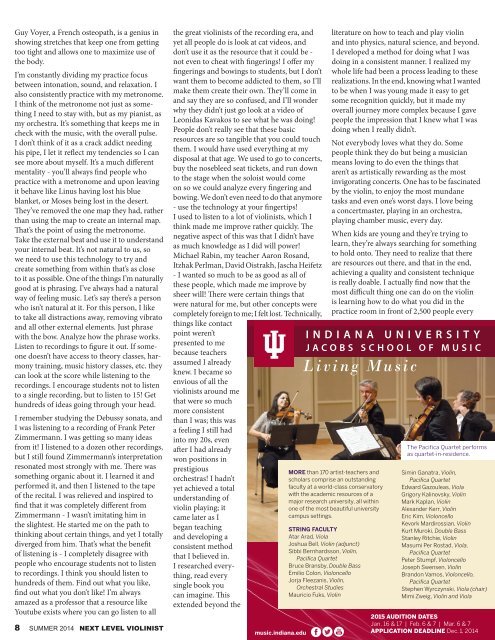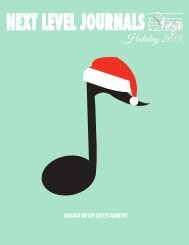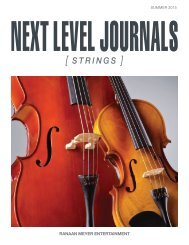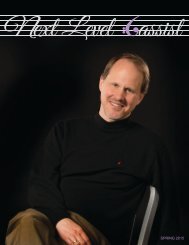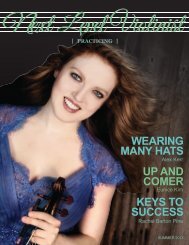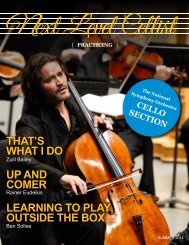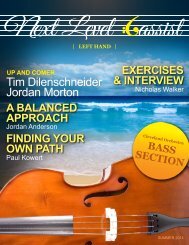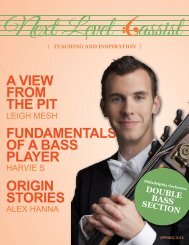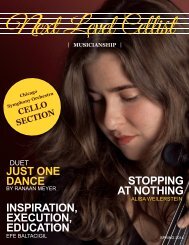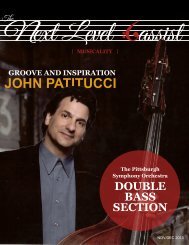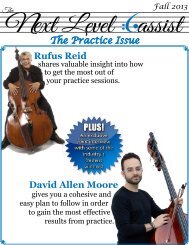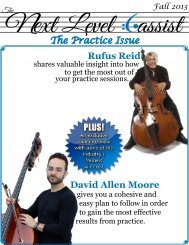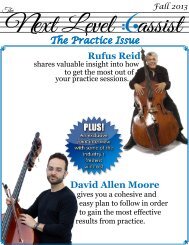Next Level Violinist promo
Create successful ePaper yourself
Turn your PDF publications into a flip-book with our unique Google optimized e-Paper software.
Guy Voyer, a French osteopath, is a genius in<br />
showing stretches that keep one from getting<br />
too tight and allows one to maximize use of<br />
the body.<br />
I’m constantly dividing my practice focus<br />
between intonation, sound, and relaxation. I<br />
also consistently practice with my metronome.<br />
I think of the metronome not just as something<br />
I need to stay with, but as my pianist, as<br />
my orchestra. It’s something that keeps me in<br />
check with the music, with the overall pulse.<br />
I don’t think of it as a crack addict needing<br />
his pipe, I let it reflect my tendencies so I can<br />
see more about myself. It’s a much different<br />
mentality - you’ll always find people who<br />
practice with a metronome and upon leaving<br />
it behave like Linus having lost his blue<br />
blanket, or Moses being lost in the desert.<br />
They’ve removed the one map they had, rather<br />
than using the map to create an internal map.<br />
That’s the point of using the metronome.<br />
Take the external beat and use it to understand<br />
your internal beat. It’s not natural to us, so<br />
we need to use this technology to try and<br />
create something from within that’s as close<br />
to it as possible. One of the things I’m naturally<br />
good at is phrasing. I’ve always had a natural<br />
way of feeling music. Let’s say there’s a person<br />
who isn’t natural at it. For this person, I like<br />
to take all distractions away, removing vibrato<br />
and all other external elements. Just phrase<br />
with the bow. Analyze how the phrase works.<br />
Listen to recordings to figure it out. If someone<br />
doesn’t have access to theory classes, harmony<br />
training, music history classes, etc. they<br />
can look at the score while listening to the<br />
recordings. I encourage students not to listen<br />
to a single recording, but to listen to 15! Get<br />
hundreds of ideas going through your head.<br />
I remember studying the Debussy sonata, and<br />
I was listening to a recording of Frank Peter<br />
Zimmermann. I was getting so many ideas<br />
from it! I listened to a dozen other recordings,<br />
but I still found Zimmermann’s interpretation<br />
resonated most strongly with me. There was<br />
something organic about it. I learned it and<br />
performed it, and then I listened to the tape<br />
of the recital. I was relieved and inspired to<br />
find that it was completely different from<br />
Zimmermann - I wasn’t imitating him in<br />
the slightest. He started me on the path to<br />
thinking about certain things, and yet I totally<br />
diverged from him. That’s what the benefit<br />
of listening is - I completely disagree with<br />
people who encourage students not to listen<br />
to recordings. I think you should listen to<br />
hundreds of them. Find out what you like,<br />
find out what you don’t like! I’m always<br />
amazed as a professor that a resource like<br />
Youtube exists where you can go listen to all<br />
8 SUMMER 2014 NEXT LEVEL VIOLINIST<br />
the great violinists of the recording era, and<br />
yet all people do is look at cat videos, and<br />
don’t use it as the resource that it could be -<br />
not even to cheat with fingerings! I offer my<br />
fingerings and bowings to students, but I don’t<br />
want them to become addicted to them, so I’ll<br />
make them create their own. They’ll come in<br />
and say they are so confused, and I’ll wonder<br />
why they didn’t just go look at a video of<br />
Leonidas Kavakos to see what he was doing!<br />
People don’t really see that these basic<br />
resources are so tangible that you could touch<br />
them. I would have used everything at my<br />
disposal at that age. We used to go to concerts,<br />
buy the nosebleed seat tickets, and run down<br />
to the stage when the soloist would come<br />
on so we could analyze every fingering and<br />
bowing. We don’t even need to do that anymore<br />
- use the technology at your fingertips!<br />
I used to listen to a lot of violinists, which I<br />
think made me improve rather quickly. The<br />
negative aspect of this was that I didn’t have<br />
as much knowledge as I did will power!<br />
Michael Rabin, my teacher Aaron Rosand,<br />
Itzhak Perlman, David Oistrakh, Jascha Heifetz<br />
- I wanted so much to be as good as all of<br />
these people, which made me improve by<br />
sheer will! There were certain things that<br />
were natural for me, but other concepts were<br />
completely foreign to me; I felt lost. Technically,<br />
things like contact<br />
point weren’t<br />
presented to me<br />
because teachers<br />
assumed I already<br />
knew. I became so<br />
envious of all the<br />
violinists around me<br />
that were so much<br />
more consistent<br />
than I was; this was<br />
a feeling I still had<br />
into my 20s, even<br />
after I had already<br />
won positions in<br />
prestigious<br />
orchestras! I hadn’t<br />
yet achieved a total<br />
understanding of<br />
violin playing; it<br />
came later as I<br />
began teaching<br />
and developing a<br />
consistent method<br />
that I believed in.<br />
I researched everything,<br />
read every<br />
single book you<br />
can imagine. This<br />
extended beyond the<br />
music.indiana.edu<br />
literature on how to teach and play violin<br />
and into physics, natural science, and beyond.<br />
I developed a method for doing what I was<br />
doing in a consistent manner. I realized my<br />
whole life had been a process leading to these<br />
realizations. In the end, knowing what I wanted<br />
to be when I was young made it easy to get<br />
some recognition quickly, but it made my<br />
overall journey more complex because I gave<br />
people the impression that I knew what I was<br />
doing when I really didn’t.<br />
Not everybody loves what they do. Some<br />
people think they do but being a musician<br />
means loving to do even the things that<br />
aren’t as artistically rewarding as the most<br />
invigorating concerts. One has to be fascinated<br />
by the violin, to enjoy the most mundane<br />
tasks and even one’s worst days. I love being<br />
a concertmaster, playing in an orchestra,<br />
playing chamber music, every day.<br />
When kids are young and they’re trying to<br />
learn, they’re always searching for something<br />
to hold onto. They need to realize that there<br />
are resources out there, and that in the end,<br />
achieving a quality and consistent technique<br />
is really doable. I actually find now that the<br />
most difficult thing one can do on the violin<br />
is learning how to do what you did in the<br />
practice room in front of 2,500 people every<br />
MORE than 170 artist-teachers and<br />
scholars comprise an outstanding<br />
faculty at a world-class conservatory<br />
with the academic resources of a<br />
major research university, all within<br />
one of the most beautiful university<br />
campus settings.<br />
STRING FACULTY<br />
Atar Arad, Viola<br />
Joshua Bell, Violin (adjunct)<br />
Sibbi Bernhardsson, Violin,<br />
Pacifica Quartet<br />
Bruce Bransby, Double Bass<br />
Emilio Colon, Violoncello<br />
Jorja Fleezanis, Violin,<br />
Orchestral Studies<br />
Mauricio Fuks, Violin<br />
The Pacifica Quartet performs<br />
as quartet-in-residence.<br />
Simin Ganatra, Violin,<br />
Pacifica Quartet<br />
Edward Gazouleas, Viola<br />
Grigory Kalinovsky, Violin<br />
Mark Kaplan, Violin<br />
Alexander Kerr, Violin<br />
Eric Kim, Violoncello<br />
Kevork Mardirossian, Violin<br />
Kurt Muroki, Double Bass<br />
Stanley Ritchie, Violin<br />
Masumi Per Rostad, Viola,<br />
Pacifica Quartet<br />
Peter Stumpf, Violoncello<br />
Joseph Swensen, Violin<br />
Brandon Vamos, Violoncello,<br />
Pacifica Quartet<br />
Stephen Wyrczynski, Viola (chair)<br />
Mimi Zweig, Violin and Viola<br />
2015 AUDITION DATES<br />
Jan. 16 & 17 | Feb. 6 & 7 | Mar. 6 & 7<br />
APPLICATION DEADLINE Dec. 1, 2014


